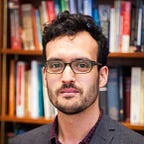Is Reality Spiritual? The Forgotten May Sinclair
May Sinclair (1863–1946) is remembered as a novelist, but not very much as a philosopher. She was, however, one of the most creative and eloquent defenders of British idealism against the attacks of early analytic philosophy.
While there has been significant work recently recovering the contributions of women in early analytic philosophy, and a small resurgence of interest in British idealism, women in British Idealism remain pretty obscure. Sinclair is mentioned only briefly in William Mander’s study of the movement, and I could find only one recent article on her philosophy, by Emily Thomas (who introduced me to it— thanks Emily!).
Her books are easily accessible online and should be read more often.
The New Idealism (1922) presents a form of idealism that is, in Thomas’s words, “both novel and creative”. Thomas’s article is a good place to start to understand the argument there. It is an admirable book, but, if I’m honest, a bit dry.
A Defence of Idealism (1917) is not dry at all. It is a very useful historical document, I think, because it shows how philosophically fertile a period the early twentieth century was for English-language philosophy before the monoculture of analytic philosophy set in. Sinclair defends idealism against a diverse crowd of rivals: Samuel Butler’s “panpsychism” (quite different from what contemporary philosophers know by that name), Henri Bergson’s “vitalism”, William James’s “pragmatism” and F.C.S. Schiller’s “humanism”, and finally, most relevantly for what came after, Bertrand Russell’s “new realism”.
Her defence against realism challenges the common narrative that early analytic philosophy established itself by vanquishing British idealism.
Sinclair treats idealism as resting on the distinction between appearance and reality, which in turn rests on showing that the apparent diversity of things in the world can only be merely apparent — the many things that common sense supposes to make up our world are really only appearances or manifestations of a single thing, the Absolute. This is generally shown by reducing the hypothesis that many things exist to contradiction, using paradoxes like those of Zeno or F.H. Bradley.
Sinclair accepts that Russell wields a formidable weapon against this line of argument — the new tools of mathematical logic. She recounts how he is able to resolve Zeno-type paradoxes by defining continuity through set-theoretic constructions while solving Bradley’s paradoxes by maintaining a particular-universal distinction.
Sinclair fights back against this attack, however, with the humble ambition of showing that monistic idealism is not decisively defeated by Russell’s pluralistic realism. Russell’s system, Sinclair succeeds in showing, has many problems of its own. Both it and monistic idealism remain live options with their own respective strengths and weaknesses.
The following chapter on “The New Mysticism” is very interesting. If logic alone does not decide in favour of either monistic idealism or pluralistic realism, there is room for an appeal to experience. Both philosophies predict the appearance of a multitude of distinct things in the world. They disagree over whether this appearance corresponds to ultimate reality, but the phenomena alone do not settle the matter in favour of either theory, since they are equally predicted by both. Certain individuals, however, report extraordinary experiences — mystical experiences — that tell of a reality beyond the ordinary world. Mystics tend to agree that this deeper reality has the features ascribed to it by monistic idealism: it is a single unity of which the many things of the ordinary world are merely manifestations.
Sinclair does not take a naively credulous attitude towards these experiences; she carefully addresses the evidence that they have merely psychological causes and agrees that this is the likeliest explanation in most cases. On the other hand, she draws upon the work of Evelyn Underhill and others to trace out a development of mysticism through history. This allows her to understand the many mystical traditions of the world as constituting the implicit development of a metaphysical theory, not just a series of individual psychological episodes. She concludes that “in the classics of Mysticism we are dealing not only with a peculiar kind of experience, but with a peculiar kind of genius” (285). The mystical tradition is a product of philosophical thought, not just unusual psychic events.
The mystical notions expressed in the poetry of Rabindranath Tagore are, Sinclair argues, much more philosophically robust than those found in most Christian mystics, who maintain a problematic “gulf fixed between the common human heart and Transcendent Being” (274). Beyond Tagore is Kabir, who Sinclair calls “the greatest of them all” (282).
Her interest in this poetry and its religious background goes beyond superficial orientalism, though of course she wasn’t a scholar of it. An interesting moment comes when she suggests a translation for the difficult Pali term, āsava:
May I suggest that, though the original figure ‘running or flowing’ has no ‘spiritual sense’ in English, it has in various languages of philosophy a metaphysical sense, which is of the first importance in this highly metaphysical Sutta? We have the “flux of things”, the “stream of consciousness”, so why not “The Book of All the Life-Streams”? (354n62).
One thing that makes Sinclair so fascinating is her astonishing breadth. She is able to competently dispute logic with Russell (though not without gaps, of course) while providing tolerably faithful renderings of Butler, Bergson, James, and the mystical authors. In developing her ideas, she draws upon a much vaster range of sources than is typical today, beyond what is taught as the “Western tradition” and into literature often dismissed as unphilosophical.
In that respect, she represents, not an outdated approach to philosophy doomed to be superseded by something more modern, but rather — at least I hope — the future.
